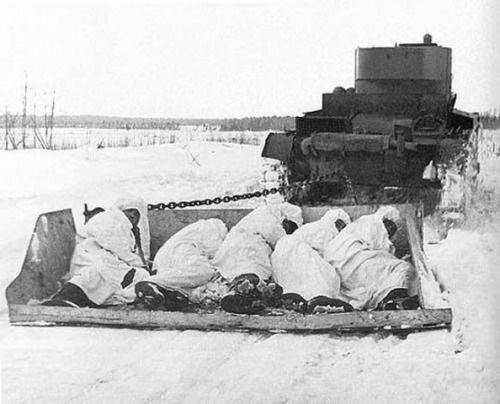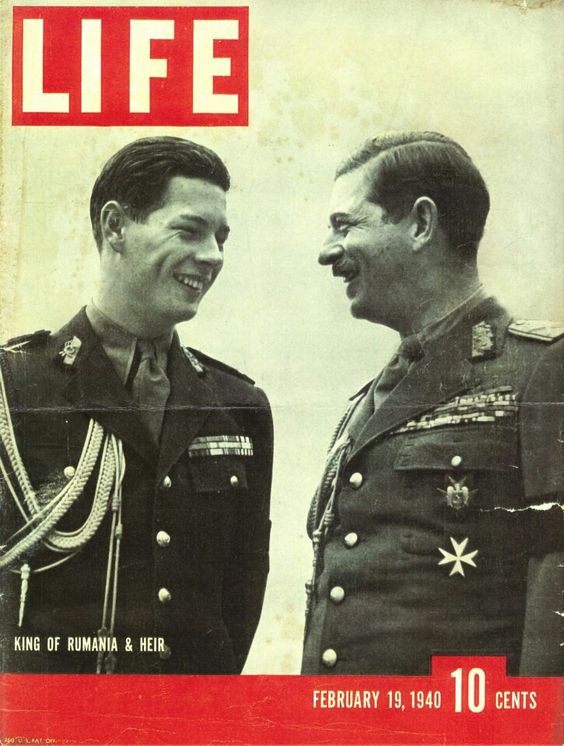Tuesday 20 February 1940
 |
| A Soviet armored sled is full of infantry. |
Winter War Peace Talks: Following their military's cracking of the Mannerheim Line, the Soviet government expresses a fresh interest in negotiations.
Battle of the Atlantic: U-54 (Korvettenkapitän Günter Kutschmann) is listed as lost from unknown causes. One theory is that it hit a mine laid by the British destroyers HMS Ivanhoe and HMS Intrepid in early Jan 1940. All 41 crew are never seen again and presumed to have perished.
Operation Nordmark, the naval exercise by the Gneisenau, Scharnhorst and Admiral Hipper, ends without the fleet sighting any convoys or being discovered by the British.
Convoy OA 095G departs from Southend.
European Air Operations: The RAF sends 20 aircraft to attack German shipping in the North Sea during the night, but does not find any. The Luftwaffe also is searching for targets and sinks the British freighter Fifeshire.
German Military: Hitler, wishing to get the Norway headache off of his desk, appoints General der Infanterie (Lieutenant General) Nikolaus von Falkenhorst ground commander for the invasion of Norway and Denmark (Operation Weserübung). Admiral Raeder is working up the naval aspects. The Fuhrer is in a hurry and tells Falkenhorst to come up with a plan by 5 p.m. Falkenhorst walks out to a nearby stationery store, picks up a Baedeker tourist guidebook of Norway, and plans his operation from that. Hitler immediately approves the plan.
The way that Hitler makes the choice shows increasing interference in army operations. This is an OKW (overall military) operation, so the OKH (army) is basically excluded from the process.
Iraq: A coup d'etat against the regime of the "four colonels" led by General Amin al-Umari fails. One of the chief sources of the complaint by General al-Umari and his confederates is the regime's decision to send Iraqi forces to join the Allied forces in the Balkans. Thus, this could be interpreted as positive for the Allies.
 |
| General von Falkenhorst. |
February 1940
February 3, 1940: Soviets Capture a BunkerFebruary 4, 1940: Peace Talks in Stockholm
February 5, 1940: Allies to Invade Norway
February 6, 1940: Careless Talk Costs Lives
February 7, 1940: IRA Terrorists Executed
February 8, 1940: Spies!
February 9, 1940: The Welles Mission
February 10, 1940: Confiscation of Jewish Goods
February 11, 1940: Soviets Attack Mannerheim Line
February 12, 1940: Breaches In Mannerheim Line
February 13, 1940: Soviets Inching Forward in Finland
February 14, 1940: Soviets Batter Mannerheim Line
February 15, 1940: Finns Retreat
February 16, 1940: Altmark Incident
February 17, 1940: Manstein and Hitler Discuss Fall Gelb
February 18, 1940: Operation Nordmark
February 19, 1940: King Gustav Says No
February 20, 1940: Falkenhorst Commands Weserubung
February 21, 1940: Radar Advances
February 22, 1940: Friendly Fire
February 23, 1940: Soviets Present Their Demands
February 24, 1940: Fall Gelb Revised
February 25, 1940: Mr. Welles Comes to Visit
February 26, 1940: Battle of Honkaniemi
February 27, 1940: Finns Retreat Again
February 28, 1940: Overseas Volunteers Help Finland
February 29, 1940: Finns Accept Soviet Terms In Principle
2019









